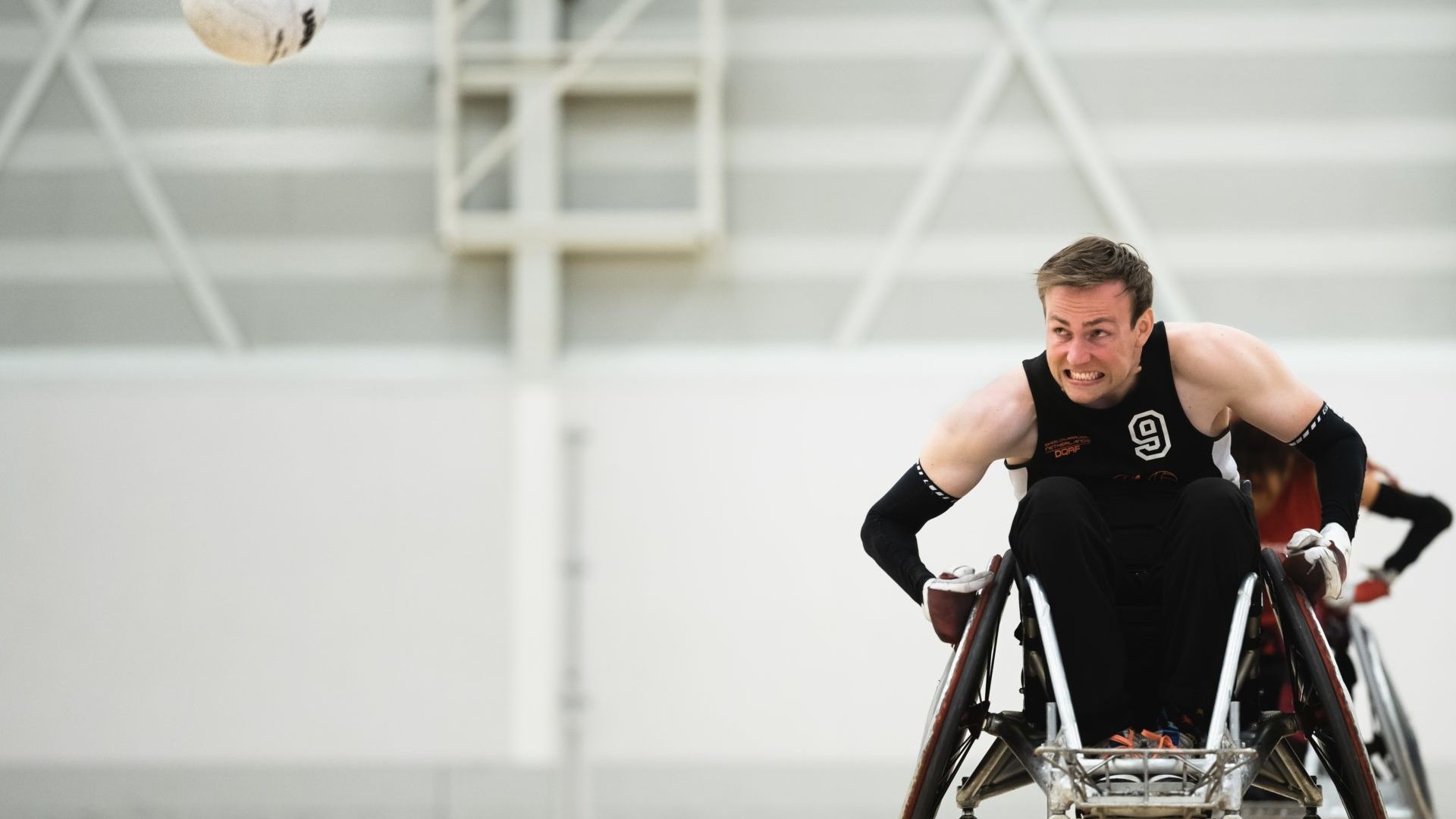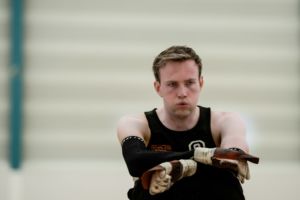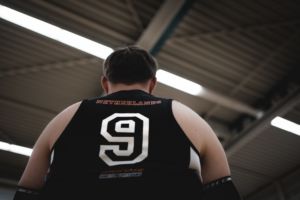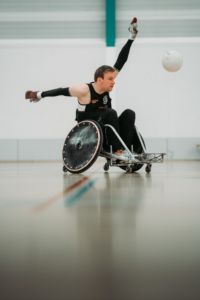Summer interview (3): Hugo van Iersel wants to be the best one-point player in the world
-
 Foto: Johannes Fiebig
Foto: Johannes Fiebig
Top sports plays a central role in the life of business administration student and wheelchair rugby player Hugo van Iersel. His spinal cord injury does not stop him from training at the highest level several days a week. The next step is taking part in the Paralympics. ‘I’ve decided to get the most out of it.’
Playing hockey at the highest level: that was the dream of Hugo van Iersel, from Sint Anthonis in Brabant. Starting from age 14, he played in Boxmeer’s first league team; by the time he was 17, he was invited to join the A1 team of NMHC in Nijmegen, playing at national level.
Summer interviews
This is the third episode of a series of summer interviews. The articles also appeared in Vox magazine, which is available everywhere on campus. You can find the magazines our special magazine bins.
‘Sports was my entire life,’ says the now 24-year old business administration student, reflecting on the years before his spinal injury. ‘I sometimes think back to what my career might have looked like … But in the end, it never went further than one training session and one practice match.’
As his dream of becoming a professional hockey player is suddenly and brutally shattered. At age 17, while playing football with some friends by a lake, Van Iersel dives after a ball, falls badly, and breaks his neck. As a consequence, he will be confined to a wheelchair for the rest of his life.
‘The ball was lying in the water, and I took a run-up from the bank,’ he says, remembering the fateful incident. ‘The beach was sloping, so I gathered quite a lot of speed. When the water was up to my knees, I thought: now I can dive. But it turned out to be much shallower than I thought. Due to the speed I was moving at, my head hit the ground first. It kind of became buried in the sand, and my body folded itself over it.’
‘I knew instantly that something had gone badly wrong. I was lying face down under water, and I couldn’t move most of my body. I knew I had to attract my friends’ attention, or I would drown. The only thing I could do was thrash about in the hope that someone would see me.’
Luckily his friends saw him in time and were able to get him out of the water, after which the rescue services arrived en masse. Van Iersel doesn’t know exactly what happened next. ‘I remember it all as a blur, also the following days. I do know that it didn’t take long before I was told that I had suffered a spinal cord injury.’
A C5/C6 spinal cord injury, to be precise: a fracture around the fifth and sixth vertebrae in the neck. ‘At first, I couldn’t do anything. Very slowly, I regained some function: now I can move my shoulders and arms. But not completely.’
With enthusiastic movements Van Iersel shows how mobile he still is. ‘My right triceps doesn’t work, for example, but the left one does. And I’m less mobile in my wrists and fingers. But thanks to an operation in which they redirected and connected muscles and ligaments in my arms, I can now pick up things with my left hand. With my right hand, I can also pick up things quite well, despite the reduced function.’
It’s striking how down to earth Van Iersel is as he talks about his handicap. He smiles a lot, and makes jokes at his own expense. ‘My situation isn’t likely to change just because I start playing the victim,’ he says matter-of-factly. ‘After the accident, I decided straight away that I had to go on and get the most of out of it.’
‘That was also my attitude during the rehabilitation, which began in the summer. In previous years, I’d always spent the summer at hockey camp.’ Van Iersel laughs out loud. ‘People around to take care of you, great food you don’t have to cook yourself, playing sports every day: the rehabilitation felt more like summer camp.’
Fanaticism
He sees his handicap more as a challenge than a limitation. ‘If I’m alone at home and I want to grab a packet of chocolate sprinkles from the cupboard, there’s no-one to ask for help. So I come up with a construction with a stick and a hook that I use to fish what I want out of the cupboard. Or if I’m lying in bed and I need something that’s just outside my reach on the bedside table, I mess about with whatever is around to try and get it.’
This fighting spirit is typical of the Brabant native: even during his rehabilitation, he started playing sports again. ‘I pushed myself by doing the physiotherapy exercises as thoroughly as possible. After a while, I played a few times with the Mavericks (the wheelchair rugby team of the Maartenskliniek, ed.). I really liked it: playing sports is fun and physical; it allowed me to release some energy, and it was a great way to clear my mind for a bit.’
'When I’m on the field, I want to give it all I have.'
Blood runs thicker than water. Wheelchair or not, there is no such thing as gentle exercise for Van Iersel. A smile spreads across his face. ‘Gentle exercise? What a strange idea! When I’m on the field, I want to give it all I have.’
And practice shows that he does. Within a short time, upcoming talent Van Iersel managed to attract the attention of the Dutch wheelchair rugby team. Every second weekend, he drives up with his refurbished van to Sporthallen Zuid in Amsterdam, to train for two days with the Dutch team. As of writing, he has been a household name in the national selection for some years. Van Iersel doesn’t know exactly how many international matches he has played. ‘Tournaments always involve multiple matches, and I’ve played a lot of those. I’ve also taken part in three European Championships.’
Those matches are not for softies. At great speed, the players collide with each other’s wheelchairs. Van Iersel often ends up on the floor. ‘It’s part of the deal. The only thing I want at moments like this is to get back up as soon as possible and re-join the fray,’ he says resolutely.
Van Iersel’s fanaticism is also apparent when he plays with the Mavericks, as he somehow manages to be all over the field, continuously giving instructions to the other players. ‘The level here is, of course, much lower than on the national team, but it’s not a problem. For me, the most important thing is to keep challenging myself as much as I can. Here I get to pit myself against Ruben, who also plays for the Dutch team. With him, I enjoy playing one-on-one matches.’
Insight
A wheelchair rugby team is not allowed to have more than eight points. The heavier a person’s handicap, the lower their score. Since Van Iersel cannot do much due to his spinal cord injury, he is worth one point, making him a ‘one-point player’. ‘But despite my low score, I’m pretty mobile,’ he says. ‘Normally, a player with a low score would mostly play a supporting role, trying to free up other players. But I’m also quite good with the ball: I have good insight, and I make nice passes. That’s where my power lies.’
Van Iersel hopes to develop further in coming years. He is in any case setting the bar high for himself. ‘Our goal as a national team is to make it to the 2024 Paralympics in Paris. It’s not going to be easy; we didn’t do well in the last European Championship, which makes it harder to qualify. But if we work hard, we should be able to manage.’
Personally, Van Iersel also aims very high, he explains. ‘I want to become the best one-point player in the world. Is it possible? Of course. I train six times a week, including fitness and training sessions with the Mavericks and the national team. If I keep challenging myself, I should be able to manage.’
‘But it also depends on what you assess people on. A person with a different handicap might, for example, also classify as a one-point player. But say if they are able to stretch their torso – something I can’t – that will make them more agile and faster. I can train as much as I want, but physically, I would never be their match. I really have to rely on my insight.’
Burnt hands
Although things are going well when it comes to sports, Ven Iersel is still often confronted with the difficulties of living with a handicap. He used to depend on his parents, but thanks to a large van with a built-in lift and ingenious steering system, he can now drive himself from Sint Anthonis to the University or his training.
‘On campus and at the Maartenskliniek, I can easily park my van in a disabled spot, but these aren’t available everywhere. Due to the van’s size and the fact that I also need space at the back to get in and out, parking can be daunting.’
As far as Van Iersel is concerned, the campus could be made more wheelchair-friendly. ‘Look at the entrance to the Maria Montessori building. It’s a brand-new building, isn’t it? Incredibly beautiful and modern, but the paths leading to the entrance are sloping. For someone in a wheelchair, this is hard: you have to constantly brake going down. That means you have to hold the wheels back with your hands, leaving them almost burnt at times. Going back up is even harder. I’m quite fit, but the slope is so steep, that even I struggle. Someone who’s less fit might not be able to get up at all.’
And yet, the student has few other complaints. By and large, the University is pretty well-organised. Not that he spends a lot of time there, he says. ‘During the pandemic, a lot was invested in online teaching. For me, that’s ideal: it means I don’t have to come all the way to campus, which costs a lot of time. And I can watch lecture replays at a later time, so I don’t have to miss training sessions.’
A top athlete existence and continuously having to navigate your handicap: Van Iersel certainly doesn’t lead a standard student life. There’s that smile again. ‘But that doesn’t mean that I never go out for a beer! I certainly enjoy a party or a night out.’






